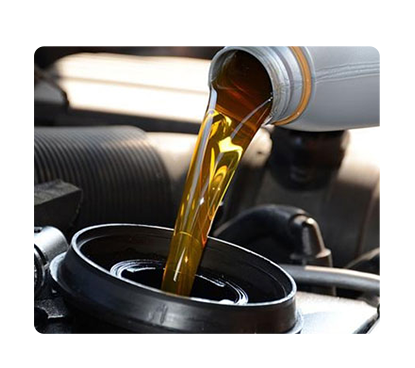Mashroo3k Economic Consulting Company offers a feasibility study for a car oil recycling plant project in Yemen. The study aims to achieve the highest return on investment and the best payback period. This study is conducted through a series of in-depth studies of the Yemen market size, an analysis of local and foreign competitors’ strategies, and the provision of competitive pricing.

The automotive oil recycling plant processes used automotive, engine, and generator oils that have lost all or some of their properties during operation. This process involves several filtration, purification, and refining processes to produce high-quality gasoline and diesel engine oils.
The automotive oil recycling plant targets factories, technical companies, smelting furnaces, oil shops, and gas stations. Mashroo3k Company’s statistics indicate a recent growth in demand for various engine oils in Yemen. This helps the project achieve high returns in a relatively short period of time.
Mashroo3k Company for Economic Consulting provides investors interested in investing in an automotive oil recycling plant project in Yemen with a set of specialized feasibility studies based on updated databases specific to the Yemeni market. This helps ensure the project’s success, achieve the highest return on investment, and provide the best payback period.

Mashroo3k for Economic Consulting is keen to ensure that its successful automotive oil recycling plant project in Yemen includes the latest technology for recycling used engine oils and relies on a fully qualified operational team with the ability to innovate and renew.


Executive summary
Study project services/products
Market Size Analysis
Risk Assessment
Technical study
Financial study
Organizational and administrative study

The Recycling Sector in the GCC Countries
Technological advancements and population growth in the GCC countries have contributed to an increase in waste generation from human activities, industrial operations, and other sectors. This growing waste volume has posed a significant challenge for GCC governments, requiring them to accelerate their waste management efforts to prevent environmental and health issues. The total collected waste (both hazardous and non-hazardous) in the GCC was estimated at approximately 131.8 million tons, distributed as follows: 1.2% hazardous waste and 98.8% non-hazardous waste.
Project “Mashroo3k” for Economic and Administrative Consultancy presents the key indicators of the recycling sector in the GCC countries:
The total volume of hazardous waste collected in the GCC is 1.6 million tons.
The total volume of non-hazardous waste collected in the GCC is 130.2 million tons.
Hazardous waste is divided into medical waste (6%), industrial waste (81.8%), and other waste (12.2%), including batteries and electronic waste.
Non-hazardous waste is categorized into construction waste (40.7%), household waste (25%), green waste (1.7%), and other waste (32.5%).
The amount of treated waste from total collected waste is 51% (67.2 million tons).
The industrial waste collected in the GCC amounts to 1.3 million tons, with Saudi Arabia and the UAE contributing 63.1% and 19.3%, respectively.
The volume of non-hazardous waste collected from households in the GCC is 32 million tons.
The UAE leads in waste recycling efforts, processing 42.8% of its waste through recycling.
The amount of hazardous waste recycled in the GCC is 100,000 tons (9.3%) of the total treated hazardous waste.
Saudi Arabia generates the highest volume of solid waste, exceeding 16 million tons annually, followed by the UAE with approximately 5.4 million tons annually.
Food and green waste: 58%
Glass: 3%
Metals: 3%
Paper and cardboard: 13%
Plastic: 12%
Wood: 1%
Rubber and leather: 2%
Other waste: 8%
Hazardous waste treatment:
Incineration: 9%
Landfilling: 51.7%
Recycling: 9.3%
Other methods: 30%
Non-hazardous waste treatment:
Landfilling: 51%
Other methods (including incineration and recycling): 49%
Reducing primary energy consumption by 4%.
Creating 50,000 jobs in the recycling industry.
Reducing carbon dioxide emissions by 13 million tons annually.
Contributing $138 billion in economic returns for GCC countries between 2020 and 2030.
Project “Mashroo3k” strongly recommends investing in the recycling sector due to the following factors:
Global municipal solid waste production is approximately 2.01 billion tons and is expected to reach 3.40 billion tons by 2050.
In 2014, global e-waste production stood at 12.8 million metric tons, increasing to 53.6 million metric tons by 2019.
Plastic and paper waste account for approximately 29% of total global waste, making them highly profitable sectors for recycling investments.

Project “Mashroo3k” confirms that Saudi Arabia now generates over 45 million tons of waste annually. With the Saudi government aiming to increase the recycling rate from 1% to 80% by 2035, the company believes that investing in this vital sector will be highly profitable.
Recycling glass and metals alone could save 45,000 terajoules of energy in the Kingdom.
Using all food waste in Saudi Arabia for biogas production could generate 3 terawatt-hours of electricity per year.
Processing plastics and mixed waste (such as paper, cardboard, wood, textiles, and leather) through pyrolysis could generate between 1 and 1.6 terawatt-hours of electricity annually.
Project “Mashroo3k” emphasizes that recycling is one of the most promising sectors in Saudi Arabia, offering real investment opportunities, particularly as the country shifts towards a green economy. Saudi Arabia’s commitment to environmental sustainability is a key priority under Vision 2030, making this sector a strategic investment choice.
The global waste management market was valued at $989.2 billion in 2021 and is projected to grow at a CAGR of 6.2% from 2022 to 2030, reaching $1,685.5 billion by the end of the forecast period.
The Middle East & North Africa (MENA) region is expected to expand its waste management and recycling sector at a CAGR of 6.3% between 2022 and 2030. This growth is driven by:
Rising awareness of the sustainable benefits of waste recycling.
Population growth and increasing urbanization.
Economic expansion and changing consumption patterns, all of which necessitate investment in waste management.